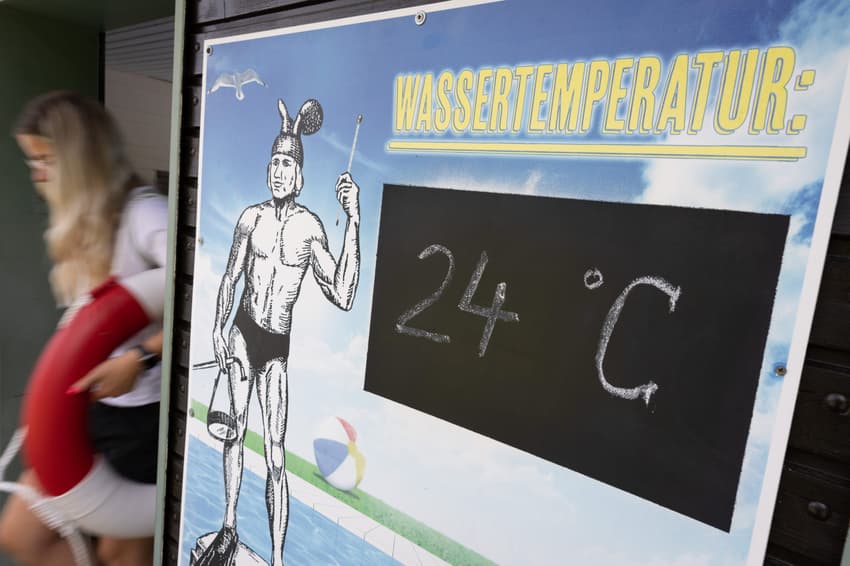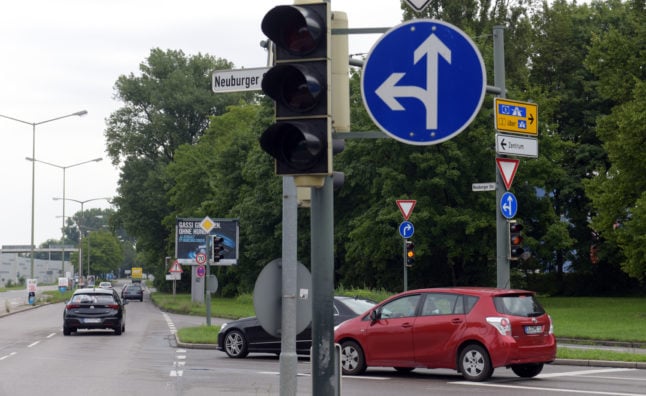'No-one should freeze': German cities plan public warming halls for winter

From turning off water fountains and turning down the temperature at pools, to preparing emergency halls for people to keep warm, districts across Germany are stepping up their plans in case there is a gas shortage.
With fears that Russia will further reduce or even cut the gas supply, Germany is trying to save energy ahead of the colder months.
Cities across the country are forming crisis teams and developing emergency plans.
Ludwigshafen, a city in Rhineland-Palatinate, is planning to set up halls where people who can't afford to heat their homes can warm up.
"We are currently preparing for all emergency scenarios with a view to autumn and winter," mayor Jutta Steinruck, of the Social Democrats, told Bild newspaper. The Friedrich-Ebert-Halle is to serve as a central 'warming-up' station for members of the public.
READ ALSO: Germany frets over reduced Russia gas supplies
The multi-purpose hall, which previously hosted sporting events, exhibitions and concerts, was used as a vaccination centre during the height of the Covid-19 pandemic. Instead of jabs, heat will be available there free of charge in future.
Other areas, such as Neustadt, Frankenthal and Landau, are also planning similar initiatives.
Head of the German Association of Towns and Municipalities, Gerd Landsberg, said other places in Germany should consider this.
"Since no one can say exactly how dramatic the development will be, consideration should be given to providing warmth islands or 'warming rooms' where elderly people in particular can stay during a very cold winter," Landsberg told Bild am Sonntag.
At this stage, authorities are still unsure whether gas will be scarce in winter - but they are preparing for the worst case scenario.
Saving energy in the current situation is a task for society as a whole, Verena Göppert, deputy managing director of the German Association of Cities and Towns, told DPA.
She said cities are "turning off lights, not using hot water in public buildings, turning off fountains, and changing the temperature of air-conditioning systems and bathing water".

Broken traffic lights in Augsburg in 2017. Cities may turn off some traffic lights at night to save energy. Photo: picture alliance / Stefan Puchner/dpa | Stefan Puchner
The Düsseldorf Ministry of Economics and Climate Protection said it was preparing to "save energy in the short term and to react to the gas shortage".
According to a spokesperson, air-conditioning systems will not be used as much in summer, and the "availability of hot water in kitchens and sanitary facilities" will be reduced.
READ ALSO: How Germany is saving energy ahead of uncertain winter
Meanwhile, the city of Rendsburg in northern Germany has cancelled its ice rink at this year's Christmas market to save energy because the cooling units use a lot of electricity, a spokeswoman said last week.
Göppert said cities are working out contingency plans with crisis teams and suppliers in case the federal government declares a gas emergency and gas is rationed. There is close coordination with the federal and state governments as well as the Federal Network Agency.
However, even if gas is rationed, residents will be protected. "If the gas tap is turned off in Germany, private households will be among the most protected customers, so they will be the last to have their energy rationed," Göppert stressed.
"One thing is clear: no one should have to freeze in winter."
In view of high energy costs and a possible further shortage of gas, the social association VdK Germany has urged for better protection for tenants and consumers.
No one should lose their flat in autumn and winter if heating costs can no longer be paid, VdK President Verena Bentele said.
"The ultimate goal must be that no one has to sit in a cold flat and go to a public room to keep warm," she said.
READ ALSO: German households could see ‘four-digit’ rise in energy costs this winter
On Monday, Russian firm Gazprom started 10 days of routine maintenance on its Nord Stream 1 pipeline on Monday, leaving Germany and other European countries anxiously waiting to see if the gas comes back on.
"We are confronted by an unprecedented situation - anything is possible," German vice-chancellor Robert Habeck said at the weekend.
"It is possible that the gas will flow once more, even at a higher volume level than before."
But, he warned that "it is possible that nothing comes through, and we still have to prepare for the worst".
Germany imports about 35 percent of its gas from Russia compared with 55 percent before the Ukraine conflict started.
Last week, German parliament agreed a plan which includes limiting winter heating to a maximum 20C and cutting hot water supplies in individual offices.
Comments
See Also
With fears that Russia will further reduce or even cut the gas supply, Germany is trying to save energy ahead of the colder months.
Cities across the country are forming crisis teams and developing emergency plans.
Ludwigshafen, a city in Rhineland-Palatinate, is planning to set up halls where people who can't afford to heat their homes can warm up.
"We are currently preparing for all emergency scenarios with a view to autumn and winter," mayor Jutta Steinruck, of the Social Democrats, told Bild newspaper. The Friedrich-Ebert-Halle is to serve as a central 'warming-up' station for members of the public.
READ ALSO: Germany frets over reduced Russia gas supplies
The multi-purpose hall, which previously hosted sporting events, exhibitions and concerts, was used as a vaccination centre during the height of the Covid-19 pandemic. Instead of jabs, heat will be available there free of charge in future.
Other areas, such as Neustadt, Frankenthal and Landau, are also planning similar initiatives.
Head of the German Association of Towns and Municipalities, Gerd Landsberg, said other places in Germany should consider this.
"Since no one can say exactly how dramatic the development will be, consideration should be given to providing warmth islands or 'warming rooms' where elderly people in particular can stay during a very cold winter," Landsberg told Bild am Sonntag.
At this stage, authorities are still unsure whether gas will be scarce in winter - but they are preparing for the worst case scenario.
Saving energy in the current situation is a task for society as a whole, Verena Göppert, deputy managing director of the German Association of Cities and Towns, told DPA.
She said cities are "turning off lights, not using hot water in public buildings, turning off fountains, and changing the temperature of air-conditioning systems and bathing water".

The Düsseldorf Ministry of Economics and Climate Protection said it was preparing to "save energy in the short term and to react to the gas shortage".
According to a spokesperson, air-conditioning systems will not be used as much in summer, and the "availability of hot water in kitchens and sanitary facilities" will be reduced.
READ ALSO: How Germany is saving energy ahead of uncertain winter
Meanwhile, the city of Rendsburg in northern Germany has cancelled its ice rink at this year's Christmas market to save energy because the cooling units use a lot of electricity, a spokeswoman said last week.
Göppert said cities are working out contingency plans with crisis teams and suppliers in case the federal government declares a gas emergency and gas is rationed. There is close coordination with the federal and state governments as well as the Federal Network Agency.
However, even if gas is rationed, residents will be protected. "If the gas tap is turned off in Germany, private households will be among the most protected customers, so they will be the last to have their energy rationed," Göppert stressed.
"One thing is clear: no one should have to freeze in winter."
In view of high energy costs and a possible further shortage of gas, the social association VdK Germany has urged for better protection for tenants and consumers.
No one should lose their flat in autumn and winter if heating costs can no longer be paid, VdK President Verena Bentele said.
"The ultimate goal must be that no one has to sit in a cold flat and go to a public room to keep warm," she said.
READ ALSO: German households could see ‘four-digit’ rise in energy costs this winter
On Monday, Russian firm Gazprom started 10 days of routine maintenance on its Nord Stream 1 pipeline on Monday, leaving Germany and other European countries anxiously waiting to see if the gas comes back on.
"We are confronted by an unprecedented situation - anything is possible," German vice-chancellor Robert Habeck said at the weekend.
"It is possible that the gas will flow once more, even at a higher volume level than before."
But, he warned that "it is possible that nothing comes through, and we still have to prepare for the worst".
Germany imports about 35 percent of its gas from Russia compared with 55 percent before the Ukraine conflict started.
Last week, German parliament agreed a plan which includes limiting winter heating to a maximum 20C and cutting hot water supplies in individual offices.
Join the conversation in our comments section below. Share your own views and experience and if you have a question or suggestion for our journalists then email us at [email protected].
Please keep comments civil, constructive and on topic – and make sure to read our terms of use before getting involved.
Please log in here to leave a comment.